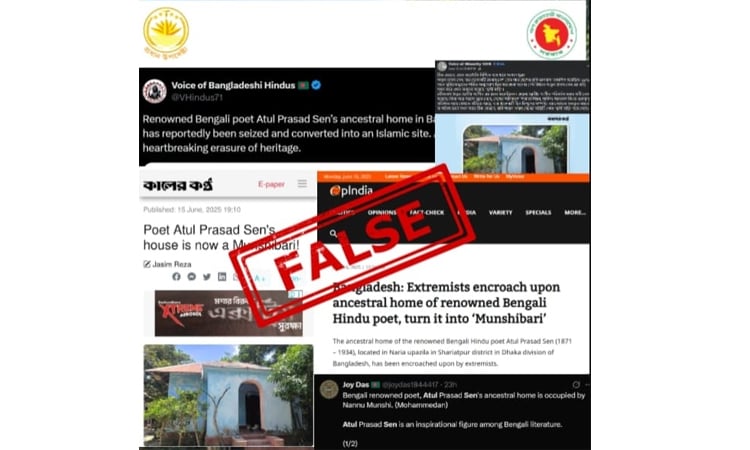
DHAKA, June 18, 2025 (BSS) – Chief Adviser’s Press Wing has debunked media reports published on the ancestral home of renowned Bengali poet Atul Prasad Sen, terming those false ones.
“Recently, a false claim circulated online alleging that due to negligence and lack of government oversight, the ancestral home of renowned Bengali poet Atul Prasad Sen had been illegally seized by extremists,” the press wing said in a statement posted on its verified Facebook page – CA Press Wing Facts – on Tuesday night.
This false narrative is being weaponized on social media, where some users attempted to link it to broader claims of attacks on Hindus, Bengali culture, and secularism under Bangladesh’s interim government, it said.
The rumour circulated widely after Bangladesh’s daily Kaler Kantha published a sensational piece asserting that the poet’s ancestral home in Naria upazila of Shariatpur had been unlawfully occupied by a local influential individual.
“Despite the seriousness of the allegation, the report lacked any credible sources or evidence and fell short of basic journalistic standards,” the statement read.
Subsequently, Indian outlet OpIndia echoed Kaler Kantha’s claims and took them further — accusing “extremists” of occupying the property, thereby amplifying the original misinformation.
However, historical records and local accounts thoroughly disprove these claims, according to the statement.
Atul Prasad Sen was born in 1871 at his maternal uncle’s residence in Dhaka, later moved to Kolkata for his education, and eventually settled in Lucknow, where he passed away in 1934.
He is not known to have lived in the Shariatpur property. Following Partition, his younger brother, Basanta Kumar Sen, sold all family property before leaving the area. The property in question has passed through several hands via lawful transactions since the 1960s.
Today, it is owned and inhabited by the family of the late Ali Azam Munshi, whose ownership is rooted in documented sales, not illegal encroachment.
Importantly, the property has never been recognised by any governmental or archaeological authority as heritage or protected land. It was not treated as abandoned property under prevailing laws, as it had been sold—unlike many other Hindu-owned assets from that era.
One of the houses left behind by the Sen family had long been renovated by the Munshi family, who continue to live there without dispute.
“Thus, any claims of ‘encroachment’ or ‘extremist takeover’ are factually inaccurate and seem designed to stoke communal tensions,” the statement said.
Lately, the press wing said, platforms like OpIndia and other Indian media outlets have published a slew of articles aiming to portray Bangladesh’s interim government as fostering religious extremism.
“However, these reports lack journalistic integrity and may simply echo the talking points of the recently ousted Awami League regime,” it said.